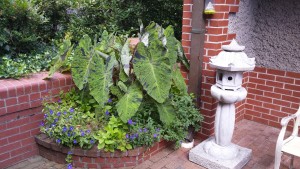‘Mojito’ elephant ear (Colocasia esculenta), aka taro plant, has become a new favorite in the Conlon garden where it is not dependably winter hardy (Zone 6b). According to Tony Avent at Plant Delights Nursery in Raleigh, NC, tubers are dependably winter hardy in zones 7b -10. ‘Mojito’ (pronounced “Mo-he-toe”) is a sport of Colocasia ‘Burgundy Stem’ x ‘Black Marble’. Its fancy leaves are medium green splashed with dark purple flecks. ‘Mojito’ is a thick-leaved, strong stemmed plant that stands up in summer downpours.
Elephant ears are easy to grow. Your garden or container soil (media) should be well-drained, mildly acidic, organically rich. Soil pH should range between 5.6 and 7.0. Locate in direct or partial sunlight and keep soil moderately moist. Keep garden plants adequately mulched and away from prevailing winds.
Elephant ears are constant feeders and love a steady diet of water plus water-soluble fertilizer such as Miracle-Gro®, Jack’s Classic®, or Peters® every 2-3 weeks from planting time (mid-May here in zone 6b) to late August at the one-half strength rate. By late summer expect Mojito to reach 2-3 feet high and wide, less so on drier sites.
Disease and pest problems are rare if plant(s) are properly sited and cared for. Potential crown or stem rot problems are best avoided by growing in a well-drained soil (media) and by not overwatering.
In areas with moderate winters (zone 7) elephant ears should be heavily mulched during winter to protect the central tuber which will likely perish in temps in the lower teens. Spread 2-3 inches of loose non-packing mulch such as straw or oak leaves.
In zones 5 and 6 container plants or tubers should be dug up, bagged, and stored in a cool (unheated) attached home garage where winter temps should not drop below 40 ºF. Remove all leaves and stems and hold in a semi-dormant state. At the start of spring, repot and gradually reintroduce elephant ears and other sensitive semi-tropicals to rising outdoor temperatures.
Where to purchase: independent garden centers and mail-order nurseries like Plant Delights Nursery, Raleigh, NC.



 Posted in
Posted in 
